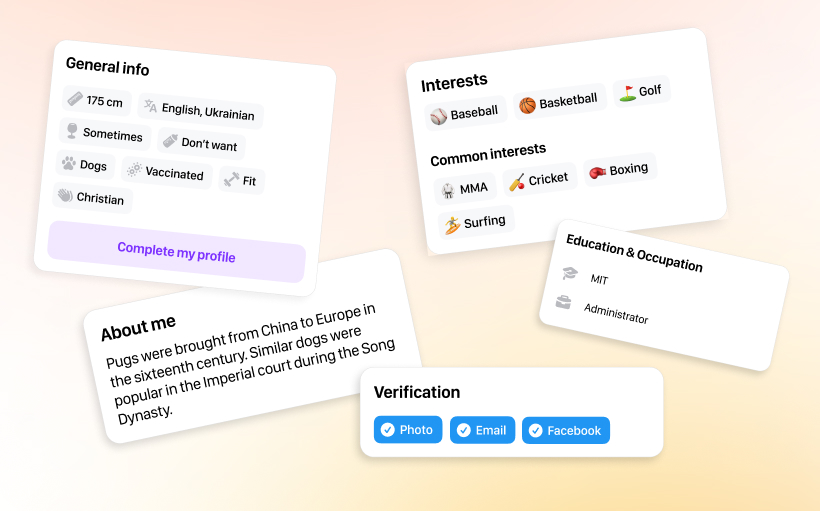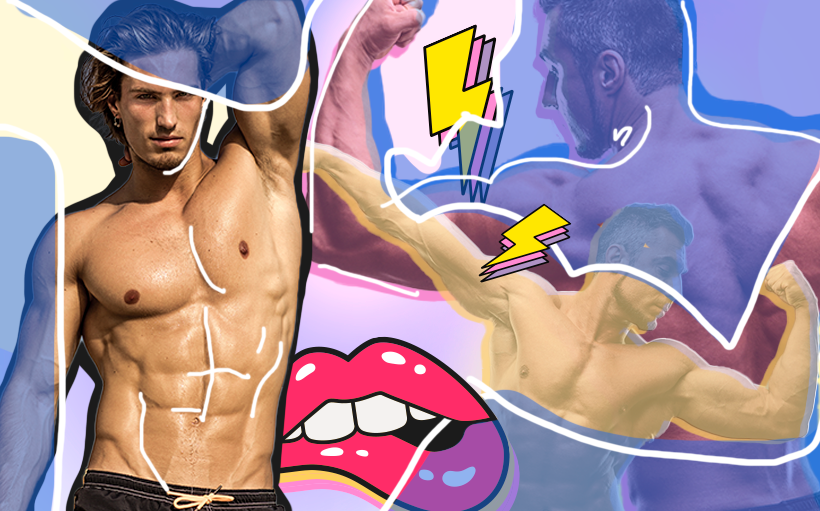I’ve always been inspired by women who are outgoing, very sure of themselves, and not afraid to be who they were, including their sex lives. Under their tutelage, I gradually shed my old self, hung out and socialized with them, and, over time, became the empowered, self-confident, and sexual woman I am today. Happy to share my insights with other women today!
When You Love Someone—Do You Really Know?
What happens when you love someone? That’s what songs and poems have been written about for centuries. And in more modern times, it is shown in the movies and other media we are all exposed to.
Of course, we are talking about romantic love here. But this is not the only type of love on the planet. Let’s discover what happens when you’re in love – and what else it can be. If you’re not sure about your feelings when you love someone, we’ll compare them with the signs of attachment, lust, being in love, narcissism and infatuation so you can have clarity about your emotions.
What Is Love?
“In relationships that harbor the potential of true love, people almost immediately feel the desire to confess and share everything about themselves, whether negative or positive. They feel immediately courageous, wanting to know and be known, no matter what the outcome.”
Randi Gunther, Ph.D, a clinical psychologist and marriage counselor
<p”>Romantic love is something complex. Not only is it kinda tough to define, but it can “mask” as other things that are not true love. So, how do you know if what you have is real?
The only thing we can tell for sure is that love is positive and helps to strengthen relationships and mankind in general. It is something permanent, long-lasting, and stable, no matter how much their behavior disappoints you or doesn’t fit your image of a perfect relationship.
Related reading: 3 Types of Love – Which One Is Yours?
Generally, our potential to love is grounded on other types of love we’ve already experienced:
- Family love: The love of our parents to us as their children. It is nurturing, protective, teaching, disciplining, and, hopefully ending with a happy, well-adjusted adult.
- Platonic love: Experiencing a strong bond with our platonic soulmates, who can be our close friends. It is completely non-sexual and may even have spiritual aspects.
- Agape: A selfless care for all humanity and nature, desiring good for all.
- Self-love: Our love to ourselves that promotes self-care and emotional health in order to be productive and have a strong sense of self-worth.
These are the types that define our ability to love someone, the internal baggage we carry into our relationships. And if something went wrong here – such as growing up with non-loving parents or developing a lack of self-love – you may face difficulties in defining love and understanding your feelings towards others. To help you find out the truth, we will compare love to relationships that may look and feel like it but really are not.

Comparing Love to What It’s Not: 5 Other Things You May Experience Now
As you read through this content, take stock of your own feelings and behaviors, as well as those of your SO. You will be able to see if what you have is true romantic love or something else.
Attachment
This is really the difference between a connection and dependency. A frequent example is how abandoned baby animals will attach themselves to “mother substitutes” and follow them around. These are normal attachment behaviors.
But when an adult comes to have a dependency on another adult in a relationship, it is not only unhealthy, it is not really love. It comes from insecurity.
Here are signs that what you have is attachment, not love:
- You need to know where your partner is, and you are anxious when you don’t know.
- You want to be together every waking moment, giving up friends and outside interests and expecting them to do the same.
- You feel desperate when you are not in a relationship and move to a new one when one fails because of your need to have someone at all times.
- You live in a rather constant fear that you may lose your partner and give them no space.
Related reading: Are You In Love or Just Clingy? 8 Love vs Attachment Differences
Attachment relationships are about what a person can get rather than give. And it’s all about having power over a partner’s actions. Because the needy person is only motivated by self, they do not encourage a partner to develop and grow independently. And they have no intention to pursue personal growth and development because that would involve being away from their partner.
Love is just the opposite. Love is all about giving, not getting. And two people who are really in love are not about power or control. They encourage each other to have independent activities and pursue their own growth and development – to be the best version of themselves.
Lust
When we first meet someone and we feel a strong attraction, it is usually due to physical chemistry. And as we start spending time together, sex usually comes pretty fast – for some even on that first night.
As time goes on, we find that physical touch and intimacy become the most important aspect of the relationship. You or your partner or both are probably “in lust” not “in love.”
Here are the most common features of being in lust:
- Every date involves sex. Now this may be common when love is new, but as the relationship moves forward, sex continues to be the primary focus of every encounter.
- One or both partners are focused solely on the other’s body and looks.
- One or both partners are not interested in having conversations about life, values, future goals, etc.
- The relationship is kinda kept at a fantasy level, rather than real feelings.
- Once the sex is over, there is little cuddling and afterglow. Each partner parts company pretty fast
Related reading: Are You in Love or Lust? Here’s Your Answer
When you love someone, you want to spend quality time with them outside of the bedroom; you want them to meet your friends, parents, and other family members. You want to plan dates that include others in your life. Even more important:
- You have deep discussions about where your life is going.
- You start planning a future together.
- You can be open about your emotions and opinions without feeling fear of criticism or judgment.
- When the excitement of the newness of the relationship wears off, you still have an intimacy that goes beyond the physical.
- You encourage each other to pursue growth and development in a positive way.
- Sex involves affection, exciting foreplay, and time for each other in the afterglow.
In short, lust is a purely physical attraction that never goes beyond that. Love may have lust in the beginning but it evolves over time into romantic relationships based on shared life goals and mutual respect. And ultimately, there may be “forever” talk of marriage.
Being in Love
At first, these two terms may seem the same to you. But there is a big difference according to a number of psychologists and relationship therapists.
Being in love is an early stage of a relationship. You are feeling excited about this new partner; you crave being with them; you are physically attracted; and you feel genuine affection. All of this gives you a new attitude about everything – you are kinda walking on air with the overwhelming newness of it all.
But is it love? Probably not – at least not yet. Here is what being in love looks like:
- You have a whirlwind of emotions going on at the moment.
- Your feelings can fade over time, as you get to know this person.
- The relationship cracks when you have issues
- You may be ready to acknowledge that this relationship is not all that healthy and is not what you are seeking
Related reading: Think You Found the One? Don’t Miss These Stages of Falling in Love!
Now, can being in love turn into real love and a permanent partnership or marriage? Absolutely. But don’t confuse what you happen to feel right now with real love.
Real love kinda looks like this:
- That whirlwind of emotions settles down. The fantasies and illusions you have had give way to a deeper connection that involves lots of communication, sharing of values, goals, and desire to see that other person grow and develop as their own person.
- When you have disagreements and even angry words, you are willing to work through them to reach a resolution and compromise, and willing to seek professional help to do this, if necessary.
- You are willing to walk in your partner’s shoes and see things from their perspective, even if it is flawed. An important note here: you both have flaws. But the flaws are less important than what holds you together.
- When you love someone, you face life’s challenges together, without blame or judgment. This is a key sign of health in a relationship. The challenges will make the beauty of your relationship stronger.
Narcissism
Narcissism is a relationship that is anything but healthy, but you won’t realize it when you are falling hard. In the beginning, a narcissist will sweep you off your feet, making you feel like the most important person in their life. And they must impress you with their importance and self-confidence. At first, you have a completely positive view and expect that they might just be the one for you.
Here is what you are really getting:
- A narcissist is a very insecure person who can only survive when those around them are pumping them up and making them feel important.
- He or she’s looking for people who are “givers,” because they don’t intend to give at all.
- You will find yourself catering to their needs and neglecting your own to a point where you may not even recognize yourself.
- They do not care about a future with you. As soon as they notice you are beginning to push in the wrong direction, they will dump you and move on to the next person who will be of service.
- They will “guilt” you into taking care of their every need. You are constantly thinking about how to please them and meet their needs.
- They see partners as objects to feed their egos. Your needs don’t matter.
Related reading: Insecure Men: How a Fragile Ego Can Ruin Romance
Others are seeing a change, but you do not really listen. This partner is consuming your time and energy. And once you figure out what’s happening, there is only one way out. Make a clean break.
When you love someone, both you and your partner commit to serving the needs of each other. There is give and take, mutual respect, and neither of you takes unfair advantage of the other. Real love is not a one-way street. You and your partner encourage and support each other in your independent pursuits.
Infatuation
According to Abigail Brenner, M.D., a psychiatrist who is in private practice, infatuation can be described as being in love with love. Here’s what infatuation looks like:
- You see that other person as perfect, and you adore everything about them.
- Your strong feelings blind you to the flaws of this person.
- When spending time with this individual, the superficial is super important – how you dress and look to them. You crave perfection that doesn’t exist.
- You stick with it until the imperfections begin to appear, and then the infatuation begins to fade.
- It can lead to poor decisions, such as jumping into living together or marriage. And when reality hits, it’s goodbye and move on to the next infatuation, only to “rinse and repeat.” You probably have stories of someone you know who pops from one relationship to the next, but nothing sticks.
Related reading: Male Maturity – When Does It Kick In?
When you love someone, both of you are grounded in reality. Over time, the flaws come to light, but you accept them as they appear. You don’t fall out of love because of them. Together, you celebrate the successes, work thru the failures, and face reality together. Whatever may happen, you face it together.
There You Have It…
“It don’t make sense but neverthelessYou gotta believe us, it’s all for the bestIt don’t make senseIt don’t add upWe’ll always love you no matter what”
James TW, lyrics of ‘When You Love Someone’
Attachment, lust, being in love, narcissism, infatuation, or real love? You should now have a good idea of what each looks like. See if you can find examples of real love among couples in your “circle,” – perhaps your parents – and have a long hard look at why their partnerships work. You’ll see real love in action.








